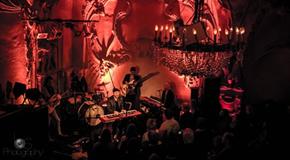Features
A Look At Hamburg’s Clubs
Andi Schmidt runs the
Apart from the classical genre, music does not receive much funding. “The problem is that promoting live music is economically unprofitable, because earnings are slim while production costs are very high. In combination with rents steadily rising, the existence of live clubs is threatened permanently,” Schmidt said.
Its booker, Christina Scholten, told Pollstar that the competition a music club faces these days has become much more diverse than, say, 15 years ago. “Are we going to Mojo or watching Netflix tonight?” she says to exemplify her point. EMBED Cat (BIG if possible) Then you have the
According to Leonhard, “one of the biggest challenges is to pull through the entire year. While countless acts take our stages between autumn and early summer, everything plays out at the festivals in the main summer season. We’re also drawn to the lawns and larger stages. But this means that the surplus we generate in winter disappears into thin air over summer. One has to meet this time with enormous creativity.” To stay relevant all three clubs have a recipe.

“We keep our team young and try to book nothing but interesting bands and [club shows],” says Molotow’s Schmidt. Since its foundation, Mojo has been known for a “timeless mix of jazz, soul and bossa nova, laced with contemporary electronic styles,” as CEO Leif Nüske puts it. “This history is the perfect foundation to constantly sound out music and sounds with a young and curious team.”
Over at the Docks and Prinzenbar “we place great importance on light, sound and decorations,” Leonhard explains. “Especially when it comes to technology, we’re always up to speed with a fantastic and creative team. We regard our light and sound engineers as artist.”
All four clubs are located right on Hamburg’s Reeperbahn, which is why they are ideal venues to host some of the 450 concerts that take place during Reeperbahn Festival each year. All four are looking forward to it. Schmidt explains, that “it’s the busiest time of the year alongside New Year’s Eve. However, as most of the bands are playing the festival, it is hard to book any of them prior to and after it.”
Nüske adds that “Reeperbahn Festival is of vital importance to Hamburg as a music destination, to the Reeperbahn itself and to us. We’ve been supporting it from year one [2006].” Leonhard calls the talent festival “our water during the drought.”
It offers the “opportunity to present ourselves to an international audience. We profit from it on multiple levels. And we’re lucky to be hosting the big labels and their showcases. We can demonstrate that we’re pros at presenting labels and their artists.”